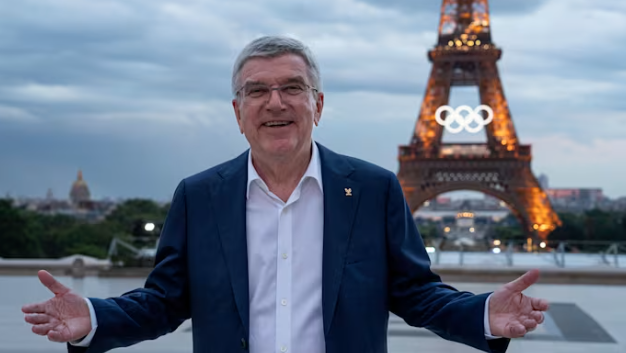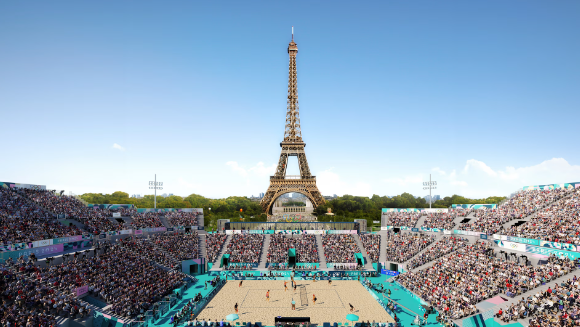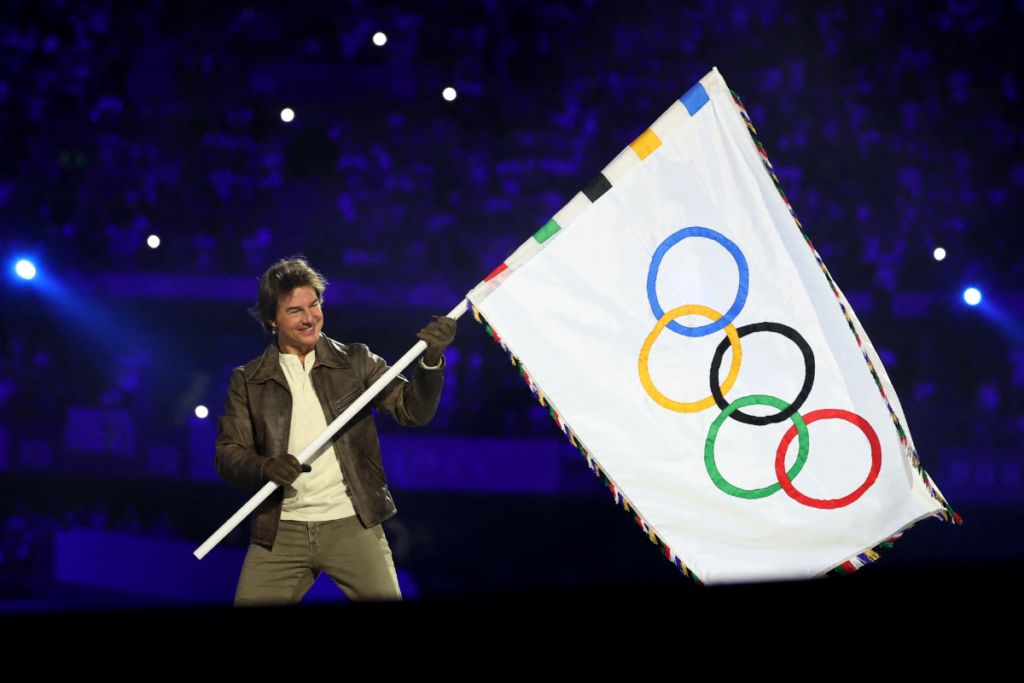Paris shows Olympic Games not Mission Impossible in multi crisis world as IOC’s top gun prepare to sign off
August 15, 2024
Olympic Games advisor, Michael Pirrie, says the Paris Games has returned the mega sporting event to its premier status in the world, and cemented legacies of major reform for the Olympic Movement under IOC President Thomas Bach and his lieutenant John Coates.
Paris ended its Games in spectacular style with Tom Cruise diving into Stade de France as MI field agent Ethan Hunt and leaping onto a motorcycle with the Olympic flag before leaving the Olympic stadium bound for Los Angeles.
This was a dream Hollywood ending to the Paris Games as the Olympics move on to the world’s movie capital.
It was Risky Business but not Mission Impossible as Cruise followed in the footsteps of Daniel Craig and James Bond 12 years earlier on Her Majesty’s Secret Service, accompanying the late Queen on a surreal helicopter ride from Buckingham Palace and parachuting into the Stratford Olympic Stadium to open the London Olympic Games.
The Paris Olympic Games had its own cinematic qualities and themes as well spanning the human experience.
Set against the backdrop of a world in turmoil, on the brink of full-scale war in the Middle East, threats of nuclear annihilation by Russia, and return of fundamentalist terror groups in Europe, on the Olympic home continent, Paris staged a joyful Games that thrilled and excited world-wide audiences.
The success of Paris was the high point of IOC president Thomas Bach’s tumultuous term in office, the latest in a succession of some of the most improbable Games scenarios to confront an Olympic leader
These include the Pyeongchang Winter Olympic Games on the politically divided and dangerous Korean Peninsula packed with nuclear missiles; Tokyo Summer Games in the middle of a killer global pandemic; and the cold diplomatic boycott of the Beijing Winter Olympic Games amid concerns of serious Chinese human rights violations .
The delivery of Paris and other Games on Bach’s watch, under his signature reform agenda, has been consequential.

This has enabled the IOC to keep the sprawling multibillion dollar Olympic enterprise of global Games assets, events and operations functioning more effectively than widely thought possible in such turbulent times.
Bach’s reforms, which provided a blueprint for Paris, have enabled him to formally announce he would stand down next year at the end of his 12 year term in office.
Bach can now step away from the IOC presidency with a sense of deep accomplishment and achievement in the aftermath of Paris
When elected Bach likened his role to that of a conductor, coordinating the IOC members and sections of the worldwide movement to provide a unified performance for audiences.
OLYMPIC SYMPHONY IN PARIS
If so, the French capital brought core elements of Bach’s reform program together in a compelling symphony of sport, perhaps entitled “Agenda 2020 concerto plus in Paris..”
Paris was an Olympic ‘Ode To Joy,’ echoing the composition’s radical call for equality, freedom and unity that reflect the spirit of France and Olympic values.
Bach, and longtime collaborator, IOC senior vice president John Coates, have redefined thinking and possibilities around the selection of host cities and staging the Games to help address challenging global conditions impacting the Games.
These have included declining interest amongst western cities and nations in hosting, economic instability, scarce resources, climate change, spiralling venue and infrastructure construction costs, as well as corruption, doping, and post-Games legacies.
There had not been a fully successful Games since London in 2012, before Bach’s presidency, and Paris was the moment the Olympic Movement had been waiting for.
Paris enabled the Games to return to a major European capital, with no major organisational problems or scandals, a beautiful host city, world famous venues and huge viewership.
This was the opportunity for the Games to recover after the isolation of Covid and return to its premier status in the world.
PARIS GAMES REVOLUTION
Paris redefined the appearance of the Games, and for the first time this century there were almost no new venues.
Designed around the Agenda 2020 reforms scaffolding, the look and layout of the Paris Games was dramatically different, utilising existing and temporary venues.
The city was utilised like never before with no central Olympic Park cluster of new venues, andsports spread across central Paris and surrounding neighbourhoods in already built or temporary settings and spaces.
This changed the shape of the Games and lowered budgets
The reforms were designed to reduce venue costs and infrastructure to enable host cities to focus on Games operations and services funded largely by private revenues from IOC Olympic partners and other Games assets such as ticketing.

Paris has been a Games changer and Games saver as well, increasing interest in Games bidding cities following a decline after massive infrastructure budgets incurred by host cities last decade on new venues and projects not included in original Games proposals
This was made possible by the expanding global industry in mobile and recyclable venue construction parts and services, such as seating, tents and generators leading to a new era of flat pack Games.
The sector is revolutionising major events, bringing old ‘dinosaur’ venues back to life as well as creating new short term purpose venues, and will feature prominently at the Los Angeles and Brisbane Games.
The new approach, led by IOC President Thomas Bach and John Coates, was designed to make the Games more affordable, sustainable and appealing for cities in times of global turbulence and economic uncertainty .
The reforms are also at the heart of worldwide efforts by governments, world governing bodies and international federations to contain costs by using existing and temporary stadiums and supporting infrastructure.
Existing buildings and temporary structures and spaces in Paris were adjusted and converted into high functioning venue environments that witnessed electrifying sporting performances.
The grandeur and majestic beauty of many of the Paris venues helped to highlight the potential of the new Games model, supporting the new emphasis focus on already constructed venues and temporary settings and backdrops.
The shift to the lower cost Games model has helped to avoid community protests and unrest over venues in Paris that have often marred previous Games.
In the recent post-election political gridlock in France, activists, protestors and residents were discussing pension and work retirement issues, not cost of Olympic venues.
IOC leaders are hoping this could mark a fundamental shift in the Games narrative for host cities, governments, and governing bodies, often forced to defend budget blow outs and little return on investment.
While Bach’s agenda points to new directions, priorities and concerns for the Games in a multi crisis world, Paris also built on Olympic heritage and traditions.
France, a nation of freedom fighters and defenders of human rights and liberties, amplified the core peace mission and message of the founder of the Olympic Movement and IOC, Parisian, Pierre de Coubertin.
The need for peace was hyper present in Paris.
Ukraine’s presence in Paris gave witness to the world of the unfolding apocalypse and was a symbol of extraordinary resilience and survival.
“It always was very chilling as you see the rocket flying, but you don’t know where it will land,” one Ukraine athlete said.
“They (Russian athletes) support this war, they (Russian soldiers) kill our athletes, children, people. They destroy our homes,” the athlete said.
The horrific toll Russia’s war has taken on Ukraine’s athletes and sports system – more than 500 senior athletes and coaches have died, hundreds of sports facilities have been destroyed or attacked and thousands of children and teenagers have been evacuated, kidnapped or in hiding – means that the nation may soon be unable to field teams at future international events
UNITED BY HUMANITY OF THE GAMES
The Agenda 2020 reforms helped to provide a compelling Games environment in Paris
The Games was a reminder of what unites the world even in troubled times, in a celebration of humanity, camaraderie and competition and of people achieving the seemingly impossible in improbable circumstances
OLYMPIC AURA RETURNS
In a football heavy world, the extraordinary diversity of skill, determination and achievement involved in the 32 Olympic sports on display in Paris produced outcomes beyond comprehension even in the world’s top sporting competitions
Athletes defied gravity as well as expectations of what was humanely possible.
Swedish-American pole vaulter, Armand Duplantis, soared so high he almost needed a parachute and oxygen mask before taking off inside Stade de France and soaring towards the heavens breaking his own world record.
The Games attracted a galaxy of the greatest athletes of the generation from the premier leagues of golf, tennis, basketball, swimming, track and field and other codes – from LeBron James and Novak Djokovic to Rory McIlroy, who said Olympic golf “might be the purest form of competition in our sport, we don’t play for money in it. It speaks volumes for what’s important in sports.”
The Games also produced the greatest stories in sport
These included an athlete whose great grandfather was on Schindler’s List, and while competing in Paris drew on the strength and spirit of her late grandmother who survived the Holocaust
The Holocaust survivor escaped to Paris in 1944, where 80 years later, her granddaughter, Jemima Montag, would win bronze in the Olympic race walk, finishing under the arches of the Eiffel Tower that once beckoned as a beacon of hope to her grandmother eight decades earlier.
Montag, representing Australia, was inspired by wearing her grandmother’s bracelet, marching in her memory and footsteps.
Conclusion
The success of Paris, new Games model, increased interest in hosting the mega event, and the Bach-Coates agenda of reforms will leave consequential legacies for the Olympic Movement as potential presidential contenders begin to consider their own agendas for the most important position in world sport.


